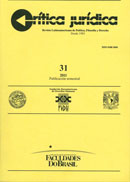Estados plurales y conflictividad en el Siglo XXI: las salidas institucionales
Contenido principal del artículo
Resumen
Los Estados son multiculturales. A lo largo de la historia, las respectivas estructuras jurídicopolíticashan debido adaptar diferentes mecanismos para manejar la convivencia entre grupos culturalmentedistintos al interior de sus fronteras. Sin embargo, en la modernidad asistimos al surgimiento deparadigmas unificadores de la diversidad política, en los que, por la dinámica del poder, tambiénquedó atrapada la diversidad cultural en medio de Estados unitarios, necesitados de centralismo estataly manejo hegemónico del poder. La construcción de Estados nacionales significó entronizar la ficcióndel estado monocultural, el mismo que se concreta en diversas políticas internas, y de la comunidadinternacional, encaminadas a fortalecer la unicidad estatal y con ello, la cultura nacional. En las cuatroúltimas décadas, las políticas estatales multiculturales han debido modificarse a causa de la emergencia dedemandas y conflictividades de origen étnico-cultural, lo que justifica una revisión de la gama de medidasque se adoptan para combatirlas, domesticarlas o convivir con ellas, con el ánimo de identificar aquellas conmayor vocación democrática.
Detalles del artículo
Cómo citar
Chávez Vallejo, G. (2013). Estados plurales y conflictividad en el Siglo XXI: las salidas institucionales. Crítica Jurídica. Revista Latinoamericana De Política, Filosofía Y Derecho, (31). https://doi.org/10.22201/ceiich.01883968p.2011.31.35409
